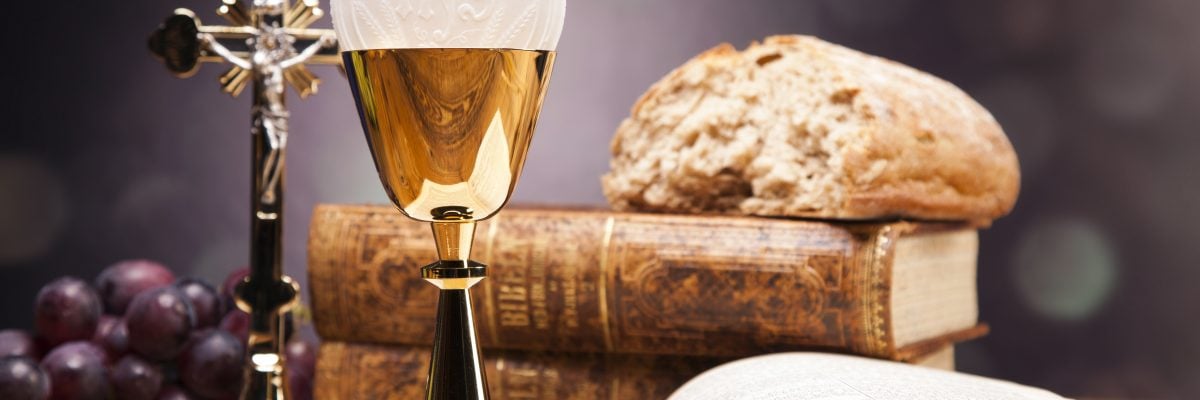
Protestant apologist Brian Culliton argued in a popular article that a close reading of the early Church Fathers illustrates they didn’t believe in the Real Presence of Christ in the Eucharist.
The Catholic Answers tract on the Real Presence provides a general response to such claims. But let’s take a closer look at the teaching of three early Church Fathers closest in time to the apostles—St. Ignatius of Antioch, St. Justin Martyr, and St. Irenaeus—and evaluate Culliton’s position.
Culliton argues that Ignatius and other Church Fathers had a merely symbolic view of the Eucharist and that their words should be understood figuratively. Culliton does acknowledge the classic passage that Catholics cite to argue that Ignatius believed in the Real Presence:
They [the Docetists, early Christological heretics] abstain from the Eucharist and from prayer because they do not confess that the Eucharist is the flesh of our Savior Jesus Christ, flesh which suffered for our sins and which that Father, in his goodness, raised up again. They who deny the gift of God are perishing in their disputes (Letter to the Smyrnaeans 6:2–7:1 [A.D. 110]).
Culliton argues that Ignatius teaches here simply that the Docetists didn’t acknowledge the Incarnation and the paschal mystery (Christ’s one sacrifice at Calvary), not that they heretically denied the Real Presence of Christ in the Eucharist. However, Culliton’s view dates, at earliest, to the Protestant Reformation. Moreover, his opinion is at odds with the plain meaning of Ignatius’s presentation, words the saint reaffirms elsewhere:
I have no taste for corruptible food nor for the pleasures of this life. I desire the bread of God, which is the flesh of Jesus Christ, who was of the seed of David; and for drink I desire his blood, which is love incorruptible (Letter to the Romans 7:3 [A.D. 110]).
Culliton is correct when he says, “Ignatius conveys that the gift of God is eternal life made possible by the sacrifice of Christ.” But he doesn’t grasp how it makes present the one sacrifice of Calvary in its completed, glorified form under the sacramental appearances of bread and wine.
Regarding St. Justin Martyr’s First Apology, Culliton says, “Earlier in his apology, Justin defended against accusations that Christians partake of human flesh and blood.” Culliton refers to Justin’s words in chapter 26: “And whether they perpetrate those fabulous and shameful deeds—the upsetting of the lamp, and promiscuous intercourse, and eating human flesh—we know not.” Here, as Culliton correctly notes, Justin inveighs against those who argue that Christians engage in cannibalism.
The Eucharist is not cannibalism. Rather, Jesus provides his very much alive and glorified body and blood in a sacramental manner, not as a mere human corpse given in a grotesque, three-dimensional way. As Justin writes a little farther on, “and what is spoken of as the blood of the grape, signifies that he who should appear would have blood, though not of the seed of man, but of the power of God” (First Apology 32). Indeed, the Eucharist is not the blood of a mere man, but that of the God-man who became flesh (John 1:14) and who thus has related divine power in offering his body and blood as salvific food.
Citing Justin’s later words in chapter 65, Culliton argues, “Christians do not partake of flesh and blood in any carnal way, but rather bread and wine mixed with water: ‘to partake of the bread and wine mixed with water’” (emphasis in the original). Yet Justin affirms here both the symbolic nature of the Eucharist—its having the appearance of bread and wine and also its being the body, blood, soul, and divinity of Jesus, as he goes on to say in chapters 65-66:
For not as common bread and common drink do we receive these; but in like manner as Jesus Christ our Savior, having been made flesh by the word of God, had both flesh and blood for our salvation, so likewise have we been taught that the food which is blessed by the prayer of his word, and from which our blood and flesh by transmutation are nourished, is the flesh and blood of that Jesus who was made flesh. For the apostles, in the memoirs composed by them, which are called Gospels, have thus delivered unto us what was enjoined upon them; that Jesus took bread, and when he had given thanks, said, “This do in remembrance of me, this is my body”; and that, after the same manner, having taken the cup and given thanks, he said, “This is my blood”; and gave it to them alone (First Apology, 66).
Similarly, Jesus describes himself as “the bread of life” and also, to the dismay of many followers, says that his flesh and blood are true food and true drink—and therefore should be received “not as common bread.” In this light, the Church agrees with Culliton “that Christians do not partake of [Christ’s] flesh and blood in any carnal way,” for we partake of it after the manner of a spirit, in a whole and undivided way under the appearances of bread and wine. And yet we partake of the real body and blood of Jesus, as various eucharistic miracles (such as Lanciano) illustrate.
Regarding St. Irenaeus, Culliton cites the saint’s magnum opus, Against Heresies, book IV, chapter 18.5:
For as the bread, which is produced from the earth, when it receives the invocation of God, is no longer common bread, but the Eucharist, consisting of two realities, earthly and heavenly; so also our bodies, when they receive the Eucharist, are no longer corruptible, having the hope of the resurrection to eternity.
“Again, the context is the resurrection of the believer,” says Culliton. “Irenaeus is speaking of Christians when he said, ‘the fleshed nourished with the body of the Lord and with his blood.’ That is, those who believe in he who was crucified for their sins are nourished with the body and blood of the Lord.” But he is mistaken. Irenaeus is clearly speaking about the impact the Eucharist has on a believer, affirming what Jesus teaches in John 6, not what happens when one simply assents to the salvific reality of Christ’s death and resurrection on one’s behalf.
“Irenaeus said the bread was no longer common bread,” adds Culliton, “thus maintaining its status as bread; and the Catholic bishops say it is no longer bread at all.” Actually, the Church doesn’t deny that the Eucharist maintains symbolic value but insists that the substance of the bread no longer remains after the consecration, because it becomes the substance of Christ’s body and blood, while the appearances (or “accidents”) of bread and wine remain.
In addition, Culliton ignores where Irenaeus says:
If the Lord were from other than the Father, how could he rightly take bread, which is of the same creation as our own, and confess it to be his body and affirm that the mixture in the cup is his blood? (Against Heresies 4:33.2).
Culliton also ignores Irenaeus’s treatment of the Eucharist in book V, chapter 2.2, in which the saint draws on the teaching of St. Paul in 1 Corinthians 10 to respond to people who denied the Real Presence:
He has declared the cup, a part of creation, to be his own blood, from which he causes our blood to flow; and the bread, a part of creation, he has established as his own body, from which he gives increase unto our bodies. When, therefore, the mixed cup [wine and water] and the baked bread receive the word of God and becomes the Eucharist, the body of Christ, and from these the substance of our flesh is increased and supported, how can they say that the flesh is not capable of receiving the gift of God, which is eternal life—flesh which is nourished by the body and blood of the Lord, and is in fact a member of him?”
Indeed, the Church Fathers acknowledged that there were heretics in the early Church who denied the Real Presence, and yet the erroneous teaching of those heretics did not endure, whereas the Church’s teaching—see Matthew 16:18, 1 Timothy 3:15—did. This is because Jesus taught his Real Presence in the Eucharist, and he promised to guide his Church into all truth.



